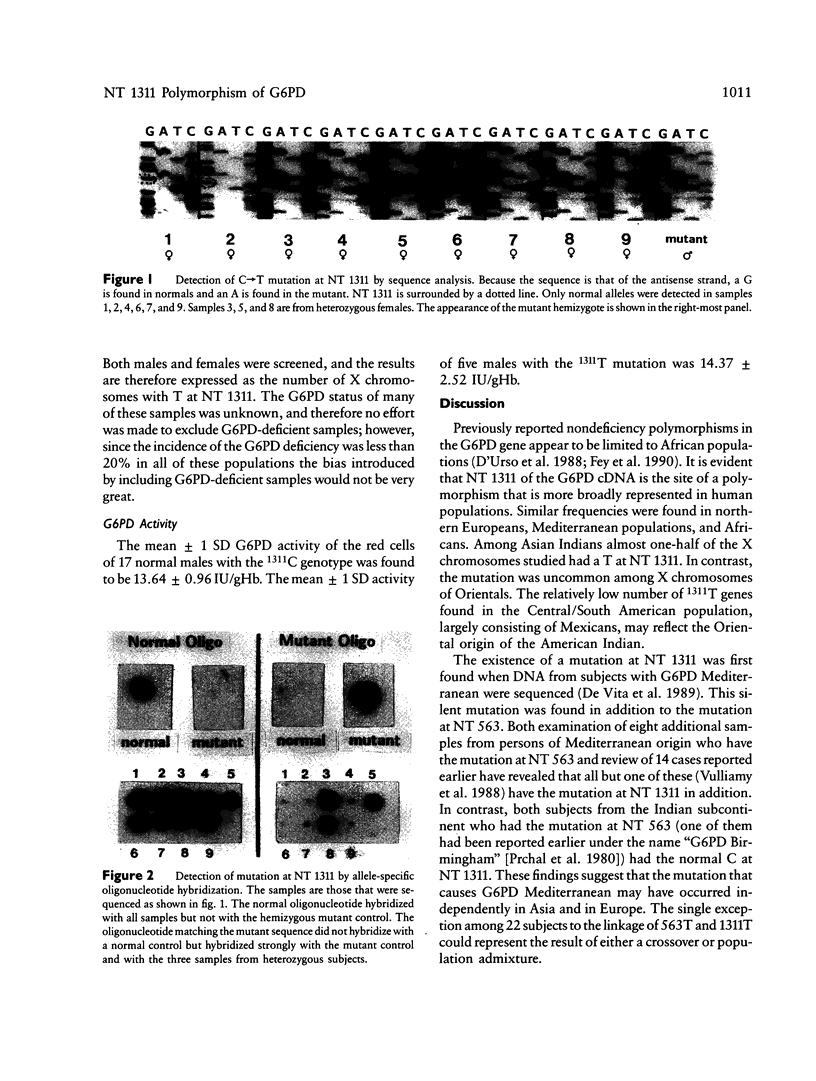Abstract
A polymorphic site exists in exon 11 of G6PD: in the wild-type enzyme, nucleotide (NT) 1311 is a C, but is some individuals from diverse populations a T is present instead. Nine of 54 X chromosomes from Europeans of mixed origins, nine of 41 X chromosomes of Ashkenazi Jewish subjects, three of 18 X chromosomes of Sicilians, five of 20 African X chromosomes, and nine of 20 Asian Indian X chromosomes had the mutant genotype. In contrast, the mutation was found in only three of 59 Oriental X chromosomes and in three of 30 Central/South American X chromosomes. The mutation was absent from four samples of chimpanzee DNA. Twenty-one of 22 male subjects from Mediterranean countries who had the G6PD Mediterranean 563T genotype investigated in the present study or reported previously had a T at NT 1311. Only one had the normal C at NT 1311. In contrast, both G6PD Mediterranean563T males from the Indian subcontinent had the normal C at NT 1311. These findings suggest that the same mutation at nucleotide 563 giving rise to G6PD Mediterranean may have arisen independently in Europe and in Asia.
Full text
PDF




Images in this article
Selected References
These references are in PubMed. This may not be the complete list of references from this article.
- Beutler E., Kuhl W. Linkage between a PvuII restriction fragment length polymorphism and G6PD A-202A/376G: evidence for a single origin of the common G6PD A- mutation. Hum Genet. 1990 Jun;85(1):9–11. doi: 10.1007/BF00276317. [DOI] [PubMed] [Google Scholar]
- Beutler E. The genetics of glucose-6-phosphate dehydrogenase deficiency. Semin Hematol. 1990 Apr;27(2):137–164. [PubMed] [Google Scholar]
- D'Urso M., Luzzatto L., Perroni L., Ciccodicola A., Gentile G., Peluso I., Persico M. G., Pizzella T., Toniolo D., Vulliamy T. J. An extensive search for RFLP in the human glucose-6-phosphate dehydrogenase locus has revealed a silent mutation in the coding sequence. Am J Hum Genet. 1988 May;42(5):735–741. [PMC free article] [PubMed] [Google Scholar]
- De Vita G., Alcalay M., Sampietro M., Cappelini M. D., Fiorelli G., Toniolo D. Two point mutations are responsible for G6PD polymorphism in Sardinia. Am J Hum Genet. 1989 Feb;44(2):233–240. [PMC free article] [PubMed] [Google Scholar]
- Fey M. F., Wainscoat J. S., Mukwala E. C., Falusi A. G., Vulliamy T. J., Luzzatto L. A PvuII restriction fragment length polymorphism of the glucose-6-phosphate dehydrogenase gene is an African-specific marker. Hum Genet. 1990 Apr;84(5):471–472. doi: 10.1007/BF00195822. [DOI] [PubMed] [Google Scholar]
- Martini G., Toniolo D., Vulliamy T., Luzzatto L., Dono R., Viglietto G., Paonessa G., D'Urso M., Persico M. G. Structural analysis of the X-linked gene encoding human glucose 6-phosphate dehydrogenase. EMBO J. 1986 Aug;5(8):1849–1855. doi: 10.1002/j.1460-2075.1986.tb04436.x. [DOI] [PMC free article] [PubMed] [Google Scholar]
- Persico M. G., Viglietto G., Martini G., Toniolo D., Paonessa G., Moscatelli C., Dono R., Vulliamy T., Luzzatto L., D'Urso M. Isolation of human glucose-6-phosphate dehydrogenase (G6PD) cDNA clones: primary structure of the protein and unusual 5' non-coding region. Nucleic Acids Res. 1986 Mar 25;14(6):2511–2522. doi: 10.1093/nar/14.6.2511. [DOI] [PMC free article] [PubMed] [Google Scholar]
- Prchal J. T., Crist W. M., Malluh A., Vitek A., Tauxe W. N., Carroll A. J. A new glucose-6-phosphate dehydrogenase deficient variant in a patient with Chediak-Higashi syndrome. Blood. 1980 Sep;56(3):476–480. [PubMed] [Google Scholar]
- Takizawa T., Huang I. Y., Ikuta T., Yoshida A. Human glucose-6-phosphate dehydrogenase: primary structure and cDNA cloning. Proc Natl Acad Sci U S A. 1986 Jun;83(12):4157–4161. doi: 10.1073/pnas.83.12.4157. [DOI] [PMC free article] [PubMed] [Google Scholar]
- Viglietto G., Montanaro V., Calabrò V., Vallone D., D'Urso M., Persico M. G., Battistuzzi G. Common glucose-6-phosphate dehydrogenase (G6PD) variants from the Italian population: biochemical and molecular characterization. Ann Hum Genet. 1990 Jan;54(Pt 1):1–15. doi: 10.1111/j.1469-1809.1990.tb00355.x. [DOI] [PubMed] [Google Scholar]
- Vives-Corrons J. L., Kuhl W., Pujades M. A., Beutler E. Molecular genetics of the glucose-6-phosphate dehydrogenase (G6PD) Mediterranean variant and description of a new G6PD mutant, G6PD Andalus1361A. Am J Hum Genet. 1990 Sep;47(3):575–579. [PMC free article] [PubMed] [Google Scholar]
- Vulliamy T. J., D'Urso M., Battistuzzi G., Estrada M., Foulkes N. S., Martini G., Calabro V., Poggi V., Giordano R., Town M. Diverse point mutations in the human glucose-6-phosphate dehydrogenase gene cause enzyme deficiency and mild or severe hemolytic anemia. Proc Natl Acad Sci U S A. 1988 Jul;85(14):5171–5175. doi: 10.1073/pnas.85.14.5171. [DOI] [PMC free article] [PubMed] [Google Scholar]
- Yoshida A., Takizawa T., Prchal J. T. RFLP of the X chromosome-linked glucose-6-phosphate dehydrogenase locus in blacks. Am J Hum Genet. 1988 Jun;42(6):872–876. [PMC free article] [PubMed] [Google Scholar]




